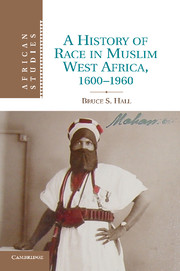Book contents
- Frontmatter
- Contents
- List of maps and figures
- Acknowledgments
- Note on orthography
- Abbreviations used in references
- Glossary
- Introduction
- PART ONE Race Along The Desert Edge, C. 1600–1900
- PART TWO Race And The Colonial Encounter, C. 1830–1936
- PART THREE The Morality of Descent, C. 1893–1940
- PART FOUR Race and Decolonization, C. 1940–1960
- Conclusion
- Index
- Misc-endmatter
- References
Introduction
Published online by Cambridge University Press: 05 August 2011
- Frontmatter
- Contents
- List of maps and figures
- Acknowledgments
- Note on orthography
- Abbreviations used in references
- Glossary
- Introduction
- PART ONE Race Along The Desert Edge, C. 1600–1900
- PART TWO Race And The Colonial Encounter, C. 1830–1936
- PART THREE The Morality of Descent, C. 1893–1940
- PART FOUR Race and Decolonization, C. 1940–1960
- Conclusion
- Index
- Misc-endmatter
- References
Summary
[I]f race is socially and historically constructed, then racism must be reconstructed as social regimes change and histories unfold … [W]e [must] recognize that a new historical construct is never entirely new and the old is never entirely supplanted by the new. Rather the new is grafted onto the old. Thus racism, too, is never entirely new. Shards and fragments of its past incarnations are embedded in the new. Or, if we switch metaphors to an archaeological image, the new is sedimented onto the old, which occasionally seeps or bursts through. Our problem then, is to figure out how this happens and to take its measure.
Thomas C. HoltRACE IN NORTHERN MALI
The language of racial difference has become a common feature of political discourse in many parts of postcolonial Africa, especially in the countries of the Sahel, the Horn of Africa, and the Great Lakes. Yet understanding how Africans have come to deploy idioms of race to describe intra-African differences has often been handicapped by academic scholarship that insists on race being understood as an exclusively European-American ideology. Mahmood Mamdani's well-known book on the Rwandan genocide is illustrative of this larger problem. He frames African uses of racial language as a kind of false consciousness derived from the colonial experience: “At the core of the ideology of Hutu Power was the conviction that the Tutsi were a race alien to Rwanda, and not an indigenous ethnic group. The shift in political vocabulary was a return to the vision of the colonial period.”
- Type
- Chapter
- Information
- A History of Race in Muslim West Africa, 1600–1960 , pp. 1 - 26Publisher: Cambridge University PressPrint publication year: 2011

